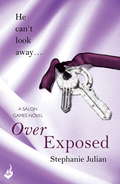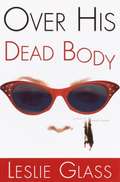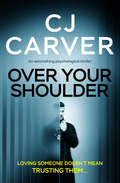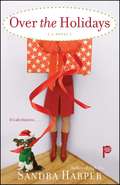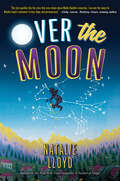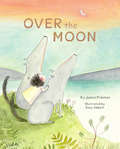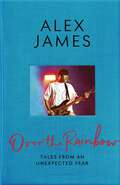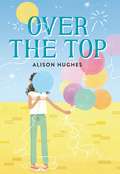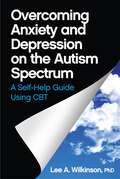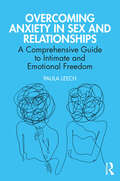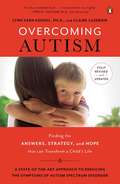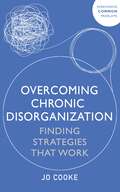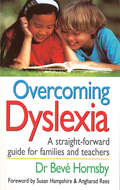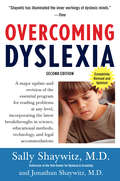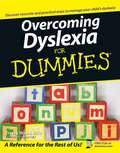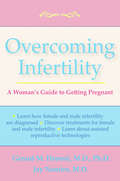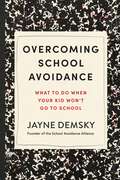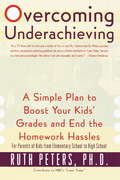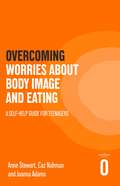- Table View
- List View
Over Exposed: Salon Games Book 3 (Salon Games)
by Stephanie JulianStephanie Julian once again delivers heart with heat in the latest installment of her Salon Games series. For fans of E. L. James, Sylvia Day, J. Kenner and Beth Kery.When the cameras are off, the real action begins...and he can't look away.Greg Hicks is a Hollywood power player. For years he's enjoyed the perks that come with being a top director and producer: the influence, the wealth...the women. But none of his many conquests have ever possessed the incredible sensuality of the young woman he once watched lose all inhibition in front of his camera. Sabrina Rodriquez's life is far from a Hollywood dream. Refusing to make the same mistakes as her unlucky-in-love mother, she's focused on her first real job and avoiding all distractions, especially those of the male variety. Yet a man as compelling as Greg is difficult to ignore. And the desires he awakens are even harder to quench...Don't miss the erotically charged first installments in the Salon Games series, By Private Invitation and No Reservations.
Over His Dead Body
by Leslie GlassIn this delightfully infectious novel of love and intrigue, Leslie Glass puts a sly and sexy spin on two of life's most devastating certainties: death and taxes. Cassandra Sales is a woman with a gift for nurturing things--her husband, the successful wine importer; her two adult children; the fabulous flowers in her garden. After twenty-six years of marriage, however, Cassie's husband, Mitch, is spending more time skipping abroad than remaining at home with her...
Over The Moon (Starfire Ser.)
by Elissa Haden GuestWhen the dreams of the past are shattered, there is always the future. Who said life was supposed to be easy? For 16-year-old Kate Baker the sudden death of her parents is a terrible shock. Then her older sister Mattie, whom she relied on so much, runs away. Although daily life with her loving Aunt Georgia and her older brother Jay continues, Kate feels an emptiness gnawing inside. Then after three years of silence, Mattie contacts the family, and Kate feels compelled to go see her sister. The odyssey that Kate begins sets changes in motion, not only for herself but for those she loves as well. Can Kate’s journey of self-discovery reunite the fragments of her past and help her make a happier future?
Over Yonder: A Novel by “Sean of the South”
by Sean Dietrich"A story of deeply complicated people having a deeply human experience." --Laura Kate Whitney, Editor at Large, Good Grit MagazineIt's never too late to find purpose.Woody Barker steps out of prison planning to live out his years on his houseboat docked on the Alabama Gulf Coast. As a defrocked priest with a heart condition and an ex-wife who still runs his life, he needs peace and a path to redemption.Caroline Boyer is seventeen, pregnant, and stuck in a loop of bad choices. At her mother's deathbed, Caroline finds herself at the center of an unexpected plot that has the potential to turn her world upside down. At the funeral, she discovers a father she's never known . . . Whether she likes it or not, her life will never be the same.Soon Woody, Caroline, and an emotional support goldfish named Gary are on a grand adventure through the Deep South. Chased by the men who are desperate to learn what Caroline's mother told her before she passed away, they use every skill they have as a new family to stay one step ahead of danger. To make it worse, former parishioners of the church that cast Woody out are determined to throw him a welcome home party. As Caroline and Woody look for answers and try to avoid disaster, they also learn how to redefine family, hope, and faith they thought they'd lost.With dry humor and compassion, beloved writer Sean Dietrich highlights the good of humanity and the light that's always just around the corner. This standalone novel includes discussion questions, which makes it perfect for book clubs. Also by Sean Dietrich: Kinfolk, The Incredible Winston Browne, Stars of Alabama, and You Are My Sunshine
Over You
by Nicola Kraus Emma McLaughlinThe authors of the bestselling novel The Nanny Diaries, Emma McLaughlin and Nicola Kraus, bring you the story of a girl who gets her heart broken…and figures out a foolproof way to get over her ex. Over You’s Max Scott had a hard time getting over Hugo, the boy who dumped her. Now it’s Max’s mission to help NYC girls get over their broken hearts fast, and with dignity. Now Max’s life is better than she ever imagined it could be. Her new business, Ex, Inc., is booming. Better still, her friendship with Ben, a truly sweet guy, could turn romantic. But when Hugo reenters the picture, Max realizes that she isn’t over him. At all.Funny, touching, and romantic, Over You is the kind of book every girl will fall head over heels for.
Over Your Shoulder: An Astonishing Psychological Thriller
by CJ CarverLoving someone doesn’t mean trusting them in this “twisting, tense, terrific” thriller from the CWA Debut Dagger–winning author of Cold Echo (LA Larkin, author of Widow’s Island).Twelve years ago, Nick’s brother, Rob, drowned. His body was never found. When Nick met Susie at his brother’s funeral, he thought it was destiny. But when Rob suddenly reappears, Nick is forced to examine everything he once knew. Why do the police want to talk to Rob? And what is he running away from? Nick wants to find his brother but if he does, he risks losing the woman he loves. Because Susie has her own secrets, and as the truth emerges, Nick finds it is those closest to us we should fear the most . . .Phenomenal Praise for CJ Carver“A terrific page-turner.” —Harlan Coben, #1 New York Times bestselling author“Solid gold.” —Lee Child, #1 New York Times bestselling author“A gripping thriller, perfect for fans of Lee Child and Mason Cross.” —The Guardian“A top-notch thriller writer. Carver is one of the best.” —Simon Kernick, #1 international bestselling author“A page-turning thriller.” —Mick Herron, CWA Gold Dagger–winning author“Don’t expect to sleep, because this is unputdownable.” —Frost Magazine
Over the Holidays
by Sandra HarperThe best holiday traditions are meant to be broken. It's only December 1, and Vanessa Clayton has been dreading Christmas since she spotted tinseled trees at her local mall in September. Thankfully, she and her husband, JT, can't afford to drag their twin boys across the country to New England for the annual celebration at her stuffy sister-in-law Patience's home. Not that Vanessa has prepared a proper Christmas for her family in years, and she has less time than ever since she agreed to consult on the script of a local play. Her older sister, Thea, is no help -- she'd rather make art and flirt with surfers than babysit her nine-year-old nephews. Then Patience drops a holiday stress bomb: Her family will come to California instead. In between "baking" cinnamon rolls for the school potluck and overbearing Patience testing her patience, Vanessa can't stop thinking about the difficult but charming playwright at work. Meanwhile, Patience's teenage daughter, Libby, obsesses over a college boy she has met by the pool, and Thea searches desperately for the meaning of Christmas -- for her latest installation, of course. As their holiday plans go comically awry, these four women discover the true spirit of the season is hidden in every festive surprise.
Over the Moon (Scholastic Press Novels Ser.)
by Natalie LloydTwelve-year-old Mallie knows better than to dream. In Coal Top, you live the story you're given: boys toil in the mines and girls work as servants. Mallie can't bear the idea of that kind of life, but her family is counting on her wages to survive. <P><P>It wasn't always this way. Before the Dust came, the people of Coal Top could weave starlight into cloth. They'd wear these dreaming clothes to sleep and wake up with the courage to seek adventure . . . or the peace to heal a broken heart. But now nothing can penetrate Coal Top's blanket of sorrow. <P><P>So when Mallie is chosen for a dangerous competition in which daring (and ideally, orphaned) children train flying horses, she jumps at the chance. Maybe she'll change her story. Maybe she'll even find the magic she needs to dream again. <P><P>But the situation proves even more dangerous when Mallie uncovers a sinister mystery at the heart of Coal Top's struggles -- a mystery some powerful people will do anything to protect.
Over the Moon: (read-aloud Bedtime Book For Toddlers, Animal Book For Kids)
by James ProimosThis sweet-natured bedtime book proves that a family is wherever you find love.When two wolves see a baby floating down a river, what do they do? Why, they take the baby home. Over the moon with joy, they nourish and teach her. And when that baby grows into a child, she and the wolves know that she will be ready to make her way in the world. Because when a child is loved, she has everything she needs.• A classic fairy-tale premise told with warmth and an inclusive sensibility for all types of families to enjoy• A touching read-aloud books for families, caregivers, and classroom storytime• James Proimos has written and/or illustrated over 20 critically lauded children's books.This gently humorous story shows that families come in many forms, and that love is about both holding on and letting go. Fans of Finn's Feather, Wild, and Wolfie the Bunnie will find Over the Moon a delightful tale for all ages.• Books for kids ages 3–5• Books about families and togetherness• Great for story timeJames Proimos has yet to rescue a small human from a river, but he has written and illustrated many books for them. James splits his time between Los Angeles and Middleburg, Virginia.Zoey Abbott is a graduate of Smith College. She spent four years working and painting in Japan. She now lives in Portland, Oregon, with her husband, their two kids, and a big dog named Carrots. This is her third book.
Over the Rainbow: Tales from an Unexpected Year
by Alex JamesA raucous, behind-the-scenes account of the year Blur got back togetherThere is nothing that can touch the sound made by a close-knit group of people who have been playing together for years and years and years, playing as though their lives depended on it. For many years, all our lives did, and actually, I’d suddenly realised, they did still.One winter’s night, Alex James received an unexpected call. Blur had been invited to play their biggest gig ever: Wembley Stadium. The only trouble was, he and his bandmates hadn’t spoken to – or even shouted at – each other for years. And he now had five children, an out-of-control menagerie of cats, and a sprawling farm to run.This is the story of what happened next. Taking us behind the scenes of a raucous, rollercoaster year, Alex describes how the band made a surprise – and emotional – return, recording an acclaimed album and playing sold-out shows around the world, from Colchester to Colombia and beyond. Plus: how he went on a crash diet to fit back into his ‘Britpop Trousers,’ somehow organised an entire festival of his own, and tried to perfect the recipe for a giant Frazzle. Over the Rainbow is a heartfelt and hilarious account of what it feels like to be catapulted back into the limelight with one of the world’s biggest bands. It is a love letter to Blur, to friendship and to music. And it shows us all that, however old – or hungover – we might feel, nothing’s ever truly over: it’s always just the start of the next thing.
Over the Top
by Alison HughesFrom an award-winning author Alison Hughes comes a new funny, honest middle grade novel following Diva Cleopatra as she tries to adapt to her new home and school while coming face-to-face with the school's mean girls. When eleven-year-old Diva Pankowski's family moves, she is horrified (but not surprised) that her mother's new dream home is a bright pink, castle-themed house. She's used to her Mom's excesses; after all, she's lived her whole life with the name "Diva Cleopatra," and her nine-year-old brother deals with "Hero Augustus." But the pink palace is only the beginning of a series of new humiliations. While acting as a glitzy mermaid-mascot for her Mom's party planning business, Diva is spotted by the class mean girls. Then, when she works up the courage to audition for her new school's production of The Wizard of Oz, she's cast in the baffling role of The Yellow Brick Road. But it's DIVAPALOOZA!, the splashy, mammoth-sized, surprise, birthday party her family throws for her (inviting everyone in sixth grade) where things really lurch toward disaster. How on earth can Diva stay true to her quiet, introverted, under-the-radar self in an in-your-face, over-the-top world?
Overcoming Anxiety and Depression on the Autism Spectrum: A Self-Help Guide Using CBT
by Lee WilkinsonCognitive Behavioral Therapy (CBT) has been shown to be effective for treating mental health problems such as anxiety and depression in individuals both with and without autism spectrum disorders. This book bridges the gap between research and practice and shows adults on the spectrum practical ways to manage their emotions. Many adults on the autism spectrum experience isolation, interpersonal difficulties, anxiety, depressed mood, and coping problems. By applying theory and concepts from autism research, this book will help adults on the spectrum to understand their challenges. The author takes the best of CBT self-help strategies, to encourage self-analysis, and to help adults on the spectrum make better decisions in activities such as employment or relationships. This is an essential self-help guide for adults on the spectrum looking for ways to cope with emotional challenges, and will also be a useful resource for clinicians, psychologists, therapists, and counselors working with them.
Overcoming Anxiety in Sex and Relationships: A Comprehensive Guide to Intimate and Emotional Freedom
by Paula LeechThis book gives readers an accessible and comprehensive understanding ofhow anxiety, stress, and pressure can have a profound impact on pleasure,connection, and sexual functioning, offering practical tips and techniquesfor resolving common sexual struggles.Anxiety can influence a multitude of aspects that make us who we are,changing how we move through, make meaning of, and interact with theworld around us. Paula Leech begins by defining anxiety and how it affectsour physiology before guiding readers to identify some of the primarysources of anxiety in their lives, such as family, gender, culture, religion,relationship dynamics, and sexual trauma. Encouraging clients to takeresponsibility, she offers alternative ways of conceptualizing and definingsex, sexuality, sexual values, and a client’s ongoing sexual development asa way of addressing some of the emotional, social, and psychological barriersto intimacy. Practical and engaging, this book includes mindfulnessand embodiment exercises to help clients release stored tension, workthrough specific sexual struggles and “dysfunctions,” and deepen theirconnections with their body.This guide is essential reading for established and training sex therapistsas well as for those who experience anxiety-basedsexual challenges withtheir partner.
Overcoming Autism
by Lynn Kern KoegelWith a 300 percent increase in the incidence of autism and autism spectrum disorders and 1 in 150 children being diagnosed with the disability, autism is now an epidemic. Fortunately, there have been huge advances in our ability to diagnose the disability at younger ages and in the development of effective interventions that can change children's lives. In Overcoming Autism, Lynn Kern Koegel, Ph. D. , one of the most well-known and highly respected experts on treating autism, shares her professional advice while coauthor Claire LaZebnik, a professional writer whose son has autism, provides insight into the daily life of parents coping with autism. It's a difficult disability to live with, but it doesn't have to devastate a family. In this book, Koegel and LaZebnik offer concrete ways to immediately begin improving the symptoms of autism and the emotional life of anyone coping with the disorder. Providing a complete program of strategies that can be tailored to any child's specific needs, this is a must-read, must-own book that offers hope through practical solutions which are warm, nurturing, and designed to fit into a family's daily life. The writers never lose sight of the humor that lurks in the quirkiness of the disability or the importance of enjoying and loving your child.
Overcoming Autism: Finding the Answers, Strategies, and Hope That Can Transform a Child's Life
by Claire Lazebnik Lynn Kern KoegelWith a 300 percent increase in the incidence of autism and autism spectrum disorders and 1 in 150 children being diagnosed with the disability, autism is now an epidemic. Fortunately, there have been huge advances in our ability to diagnose the disability at younger ages and in the development of effective interventions that can change children's lives. In Overcoming Autism, Lynn Kern Koegel, Ph. D. , one of the most well-known and highly respected experts on treating autism, shares her professional advice while coauthor Claire LaZebnik, a professional writer whose son has autism, provides insight into the daily life of parents coping with autism. It's a difficult disability to live with, but it doesn't have to devastate a family. In this book, Koegel and LaZebnik offer concrete ways to immediately begin improving the symptoms of autism and the emotional life of anyone coping with the disorder. Providing a complete program of strategies that can be tailored to any child's specific needs, this is a must-read, must-own book that offers hope through practical solutions which are warm, nurturing, and designed to fit into a family's daily life. The writers never lose sight of the humor that lurks in the quirkiness of the disability or the importance of enjoying and loving your child.
Overcoming Chronic Disorganization: Finding Strategies That Work
by Jo CookeAre you always late, do you miss appointments, lose your keys, forget your phone, miss deadlines at work on projects, have to pay penalties on late returns for paying tax?We can all be impacted by chronic disorganization - whether it be because of long term stress, menopause, diagnoses of ADHD and/or autism (to name just a few of the very many reasons). It has nothing to do with being stupid or lazy. Some brains are wired differently, and understanding this is the way forward to allow us to delegate, find strategies and systems in place to manage our day to day lives - whether in our personal or professional lives. Overcoming Chronic Disorganization will help you recognize your behaviours and put systems in place to help day-to-day tasks seem less overwhelming and challenging. It looks at the triggers and symptoms of CD, at the role of ADHD and/or autism, and at their impact on executive function. From this background of better understanding, you will discover strategies for organizing and decluttering, advice on dealing with things like procrastination, and how to develop healthy habits and keep them going. Whether for you or for a loved one, this book is full of actionable points and wise, compassionate support and is the first step on your journey to a calmer and more organized life.
Overcoming Chronic Disorganization: Finding Strategies That Work
by Jo CookeAre you always late, do you miss appointments, lose your keys, forget your phone, miss deadlines at work on projects, have to pay penalties on late returns for paying tax?We can all be impacted by chronic disorganization - whether it be because of long term stress, menopause, diagnoses of ADHD and/or autism (to name just a few of the very many reasons). It has nothing to do with being stupid or lazy. Some brains are wired differently, and understanding this is the way forward to allow us to delegate, find strategies and systems in place to manage our day to day lives - whether in our personal or professional lives. Overcoming Chronic Disorganization will help you recognize your behaviours and put systems in place to help day-to-day tasks seem less overwhelming and challenging. It looks at the triggers and symptoms of CD, at the role of ADHD and/or autism, and at their impact on executive function. From this background of better understanding, you will discover strategies for organizing and decluttering, advice on dealing with things like procrastination, and how to develop healthy habits and keep them going. Whether for you or for a loved one, this book is full of actionable points and wise, compassionate support and is the first step on your journey to a calmer and more organized life.
Overcoming Dyslexia
by Dr Beve HornsbyDyslexia is a common diagnosable condition that is estimated to affect at least one child in ten. In its most usual form it is manifested as a difficulty in learning to read and write, but it is widely misunderstood and often mistaken for low intelligence or even laziness. Dr Beve Hornsby combines her experience as a psychologist, teacher and speech therapist in this informative and reassuring book for parents and teachers of children suffering from a disability no-one can see or understand, and offers advice on how to identify, tackle and eventually overcome dyslexia. Includes up-to-date information on Attention Deficit Disorder and the relevance of the latest Education Act.
Overcoming Dyslexia
by Sally Shaywitz Jonathan ShaywitzFOR EVERYONE WHO STRUGGLES TO READ! Clear, practical, science-based information and advice for successful results. One in five American children has trouble reading. But they are not stupid or lazy. In Overcoming Dyslexia, Dr. Sally Shaywitz, co-director of the Yale Center for the Study of Learning and Attention and a leader in the new research into how the brain works, offers the latest information about reading problems and proven, practical techniques that, along with hard work and the right help, can enable anyone to overcome them. Here are the tools that parents and teachers need to help the dyslexic child, age by age, grade by grade, step by step.--What dyslexia is and why some intelligent, gifted people read slowly and painfully--How to identify dyslexia in preschoolers, schoolchildren, young adults, and adults--How to find the best school and how to work productively with your child's teacher--Exercises to help children use the parts of the brain that control reading--A 20-minute nightly home program to enhance reading--The 150 most common problem words-a list that can give your child a head start--Ways to raise and preserve a child's self-esteem and reveal his strengths--Stories of successful men and women who are dyslexic.
Overcoming Dyslexia For Dummies
by Tracey WoodIncludes tips and strategies for kids, teens, and adults with dyslexia Understand what dyslexia is, assess schools and programs, and help your child succeed Does your child mix up d's and b's? Does he or she have trouble reading? If so, the cause may be dyslexia. But don't worry -- these days, there are many ways to overcome dyslexia. This hands-on guide leads you step by step through your options -- and explains how anyone with dyslexia can achieve success in school and life. Discover how to * Recognize the symptoms of dyslexia * Understand diagnostic test results * Set up an Individualized Education Program (IEP) * Work effectively with teachers * Improve your child?s reading skills
Overcoming Infertility: A Woman's Guide to Getting Pregnant
by Gerard M Honoré Jay NemiroConfronting a problem that affects one out of 10 American couples, this all-inclusive, question-and-answer guide offers insight and encouragement in the face of infertility. Addressing the deep disappointment and emotional distress that accompany a diagnosis, this resource emphasizes that there is still hope regarding this daunting condition. Penned by a reputable endocrinologist who has treated thousands of couples, this helpful reference provides a way to navigate through a confusing time, clearly illustrating the most suitable treatment options. Topics covered include the causes of both female and male infertility, how to cope emotionally with a diagnosis, and utilizing the new Assisted Reproductive Technologies (ART). From choosing a fertility specialist to taking advantage of the most recent developments, this exhaustive study provides practical guidance for couples facing this overwhelming syndrome.
Overcoming School Avoidance: What to Do When Your Kid Won't Go to School
by Jayne DemskyA compassionate guide that tackles one of the fastest-growing issues facing families everywhere: the increasing number of children who are refusing or reluctant to attend school. When a child stops going to school, the entire family feels the impact. School avoidance may look like defiance, but it&’s often rooted in anxiety, depression, or other emotional challenges—and influenced by factors within the school environment that can make attendance feel overwhelming. Yet many families and educators are left unsure how to respond. In this groundbreaking guide, Jayne Demsky—founder of the School Avoidance Alliance—provides a practical roadmap for parents navigating this isolating and often overwhelming experience. Demsky offers strategies that help parents to confidently collaborate with schools, navigate truancy laws, and provide the emotional support kids need to return to a productive and fulfilling school life. Drawing on over a decade of experience supporting families, Demsky brings deep insight and unwavering commitment to this issue. Her perspective is further enriched by a diverse group of experts, professionals, and advocates who contributed their knowledge and expertise to this book, including these leading authorities: Dr. Christopher Kearney, Director, UNLV Child School Refusal & Anxiety Disorders Clinic; Dr. Daniel Villiers, counseling psychologist; cofounder, the Mountain Valley Treatment Center and the Anxiety Institute; and Dr. Mona Potter, child psychologist and psychiatrist; cofounder and CMO, InStride Health, and Assistant Professor of Psychiatry, Harvard Medical School.
Overcoming Underachieving
by Ruth PetersA parenting specialist and child psychologist helps tackle a headache for parents and kids alike--homework--and gets underachievers back on track.Is your child constantly bored or frustrated at school? Has homework become more of a family crisis than a learning exercise every evening? As any parent of a school-age child can tell you, helping children to achieve at school and get into a good college is a primary concern. Parents are starting to worry about this when their children are still very young, knowing that the work habits and study skills their children develop in elementary school will affect their performance in middle school, high school, and eventually, college. Unfortunately, bad habits on the part of kids and parents can result in poor academic performance and tense parent/child relationships.Now, in Overcoming Underachieving, Dr. Ruth Peters--a trusted child psychologist who has helped thousands of children and their parents solve scholastic problems--tackles kids' academic underachievement head-on, and presents a clear strategy that has worked for her clients and can work for almost all kids who aren't performing as well as they could. With a practical program targeted for parents of children from first through the twelfth grade, this book gives concrete advice about how to:-reward performance-build a child's self-concept-help kids battle apathy-identify common behavioral patterns among parents and children that lead to academic underachievementAs the market is inundated with new study aids and guidebooks and expensive tutors, Dr. Peters's straightforward, strategic plan is a breath of fresh air for parents and children. Overcoming Underachieving is the best tool for helping your kids get the better grades they want and deserve.From the Trade Paperback edition.
Overcoming Worries About Body Image and Eating: A Self-help Guide for Teenagers (Helping Your Child)
by Anne Stewart Caz Nahman Joanna AdamsMost teenagers worry about their body and appearance at some point, and some may try to alter their eating in order to change their weight or shape. If you are spending a lot of time worrying about how you look or what you are eating, it can become overwhelming and have a big impact on your life. The aim of this book is to help you to understand a bit more about these worries, what you can do about them and, most importantly, how you can develop a healthy relationship with your body and with food. If these worries take hold, there is a risk of developing an eating disorder or becoming depressed. Eating disorders can have a huge and negative impact on your physical health, your emotional wellbeing, your relationships and social life. They can take control of your mind and body, which makes it difficult to feel motivated to recover, and it can be a long and difficult journey to get back on track, so it's better to tackle these worries early on. Written by clinicians with many years of experience working in specialist eating disorder services for children and adolescents, this book follows an approach called cognitive behavioural therapy (CBT), which is a really useful way of helping us to make sense of our experiences and overcome the difficulties that we face. CBT is an evidence-based approach, which means that lots of research has been done to evaluate it and show that it can be helpful. The book includes help and support on: · Adolescent development, how we make sense of our experiences, healthy eating and how to look after yourself during the teenage years. · How you can stop body image and eating difficulties taking hold including ideas for feeling good about yourself, dealing with stress and managing social media. There is a chapter which focuses on issues for boys/young men. · How to get help from family, friends or professionals if you are struggling. There is also a chapter for parents/carers and families with suggestions on how they can help. Overcoming for Teenagers is a series to support young people through common mental health issues during adolescence, using scientific techniques that have been proven to work.Series editors: Associate Professor Polly Waite and Emeritus Professor Peter Cooper
Overcoming Worries About Body Image and Eating: A Self-help Guide for Teenagers (Helping Your Child)
by Anne Stewart Caz Nahman Joanna AdamsMost teenagers worry about their body and appearance at some point, and some may try to alter their eating in order to change their weight or shape. If you are spending a lot of time worrying about how you look or what you are eating, it can become overwhelming and have a big impact on your life. The aim of this book is to help you to understand a bit more about these worries, what you can do about them and, most importantly, how you can develop a healthy relationship with your body and with food. If these worries take hold, there is a risk of developing an eating disorder or becoming depressed. Eating disorders can have a huge and negative impact on your physical health, your emotional wellbeing, your relationships and social life. They can take control of your mind and body, which makes it difficult to feel motivated to recover, and it can be a long and difficult journey to get back on track, so it's better to tackle these worries early on. Written by clinicians with many years of experience working in specialist eating disorder services for children and adolescents, this book follows an approach called cognitive behavioural therapy (CBT), which is a really useful way of helping us to make sense of our experiences and overcome the difficulties that we face. CBT is an evidence-based approach, which means that lots of research has been done to evaluate it and show that it can be helpful. The book includes help and support on: · Adolescent development, how we make sense of our experiences, healthy eating and how to look after yourself during the teenage years. · How you can stop body image and eating difficulties taking hold including ideas for feeling good about yourself, dealing with stress and managing social media. There is a chapter which focuses on issues for boys/young men. · How to get help from family, friends or professionals if you are struggling. There is also a chapter for parents/carers and families with suggestions on how they can help. Overcoming for Teenagers is a series to support young people through common mental health issues during adolescence, using scientific techniques that have been proven to work.Series editors: Associate Professor Polly Waite and Emeritus Professor Peter Cooper
